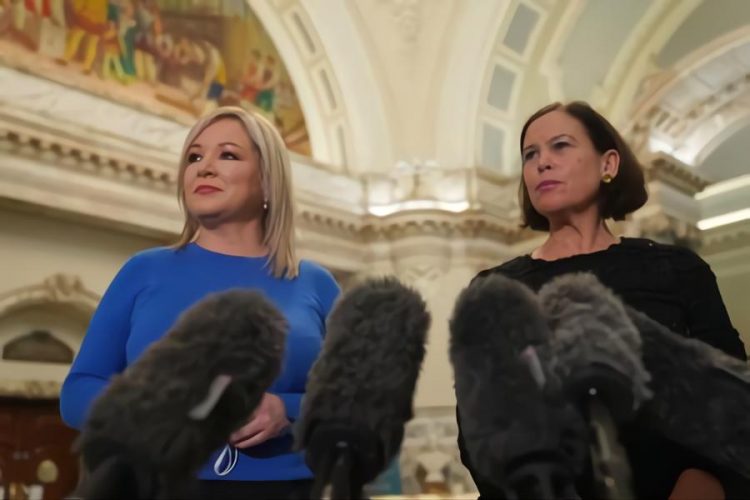Brexit legacy felt in British local elections: In London, anti-Brexit voters preferred the Labour Party to the Conservative Party, and in the “Red Wall”, which is the pro-British electorate, the Conservatives opposed the Labour Party. They won. But in Northern Ireland, the effect of choice was decisive. This is the first time a party calling for a united Ireland, affiliated with the Irish Republican Army, has won the election. The results of this election are a flawless victory for Irish nationalism and a sign of the weakening of the morale of the unionist voters and the turmoil of the unionist leaders.
The historic win for the Irish nationalist party Sinn Fein
The Irish nationalist party Sinn Fein has won the most significant seats in the Northern Ireland Assembly for the first time. Sinn Fein has secured 27 of the Assembly’s 90 seats, with almost all votes counted. The Democratic Unionist Party has 24. The historic win means Sinn Fein is entitled to the post of the first minister in Belfast for the first time since Northern Ireland was founded as a Protestant-majority state in 1921. Sinn Fein seeks a united Ireland and has long been linked to the Irish Republican Army.
But the party kept unification out of the spotlight this year during a campaign dominated by more immediate concerns, namely the skyrocketing cost of living. The Irish nationalist party Sinn Fein hailed a “new era” Saturday for Northern Ireland. It headed toward a historic election win that would make it the largest party in the legislature for the first time. With the majority of the Assembly’s 90 seats counted, Sinn Fein, which seeks to unite the North with Ireland, is vying with the Democratic Unionist Party, which has dominated Northern Ireland’s legislature for two decades. So far, both have 23 seats, but Sinn Fein was widely expected to win the most seats.
It’s a milestone for a party long linked to the Irish Republican Army. This paramilitary group used bombs and bullets to take Northern Ireland out of UK rule during decades of violence involving Irish republican militants, Protestant Loyalists paramilitaries, and the UK army and police.
Michelle O’Neill stressed that Northern Ireland’s divided politicians needed to come together next week to form an Executive in the devolved government of Northern Ireland. If none can be created within six months, the administration will collapse, triggering a new election and more uncertainty. There is “space in this state for everyone, all of us together,” O’Neill said. “There is an urgency to restore an Executive and start putting money back in people’s pockets to fix the health service. The people can’t wait.” While the Sinn Fein wins signal a historic shift that shows diminishing support for unionist parties, it’s far from clear what happens next because of Northern Ireland’s complicated power-sharing politics and ongoing tussles over post-Brexit arrangements.
Under a mandatory power-sharing system created by the 1998 peace agreement that ended decades of Catholic-Protestant conflict, the jobs of the first minister and deputy first minister are split between the biggest unionist party and the largest nationalist one. Both posts must be filled for a government to function, but the Democratic Unionist Party has suggested it might not serve under a Sinn Fein first minister. The DUP has also said it will refuse to join a new government unless there are significant changes to post-Brexit border arrangements known as the Northern Ireland Protocol.
Was it Brexit which turned Northern Ireland into Sinn Fein?
Six years after Britain voted to leave the European Union, no part of the United Kingdom has felt the sting in the tail more than Northern Ireland, where Brexit laid the groundwork for Sinn Fein’s remarkable rise in legislative elections a couple of weeks ago. With almost all of the votes counted last Saturday, Sinn Fein declared victory in the Northern Ireland Assembly, the most of any party in the territory. The Democratic Unionist Party, which represents those who want Northern Ireland to remain part of the United Kingdom, slipped to second place. “Today ushers in a new era which I believe presents us all with an opportunity to re-imagine relationships in this society based on fairness, based on equality and the basis of social justice,” said Michelle O’Neill, the party’s leader who is set to become the region’s first minister.
Although Brexit was not on the ballot, it cast a long shadow over the campaign, particularly for the DUP. This flagship unionist party has been at the helm of Northern Ireland’s power-sharing government since it was created by the Good Friday peace agreement nearly a quarter-century ago. Brexit’s legacy rippled through local elections across the British Isles: In London, where anti-Brexit voters turned Conservative Party bastions over to the Labour Party, and in the “red wall,” England’s pro-Brexit rust belt regions, where the Conservatives held off Labour. But in Northern Ireland, Brexit’s effect was decisive.
The election results are minor a breakthrough for Irish nationalism than a marker of the demoralization of unionist voters, the disarray of their leaders, and an electorate that prioritized economic issues over sectarian struggles. The DUP struggled to hold together voters who were divided and angry over the North’s altered status; it is the only member of the United Kingdom that shares a border with the Republic of Ireland, a member of the EU. That hybrid status has complicated life in many ways, most notably necessitating a complex trading arrangement, the Northern Ireland Protocol, which imposes border checks on goods flowing to Northern Ireland from mainland Britain. Many unionists complain that it has driven a wedge between them and the rest of the United Kingdom by creating a border in the Irish Sea.
Conclusion.
While a Sinn Fein win would signal a historic shift that shows diminishing support for unionist parties, it’s unclear what happens next because of Northern Ireland’s complicated power-sharing politics and ongoing tussles over post-Brexit arrangements. Those post-Brexit rules, which took effect after Britain left the European Union, have imposed customs and border checks on some goods entering Northern Ireland from the rest of the UK. The arrangement was designed to keep an open border between Northern Ireland and EU member Ireland, a vital pillar of the peace process. But it angered many unionists, who maintain that the new checks have created a barrier between Northern Ireland and the rest of the UK that undermines their British identity. This issue not only turned away Unionists from the UK but is the talk of the whole of Northern Ireland. Unionists must think it over if they want to see the frame of their party alive in the future. They should talk with Sinn Fein over this, as Sinn Fein is reasonably transparent in the nation-building and the Irish Unity. Persuading the DUP to join a new government and pressing the EU to agree to significant changes in post-Brexit arrangements will pose a headache for British Prime Minister Boris Johnson. Britain’s Conservative government says the Brexit customs arrangements cannot work without unionist support in Northern Ireland. Johnson has threatened to unilaterally suspend the Brexit rules if the EU refuses to change them.





























